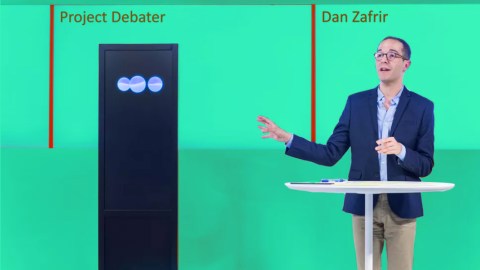Artificial intelligence wins a debate against a human—twice

In the year 1770, a chess-playing “automaton” known as The Turk debuted in Vienna, Austria. It appeared to beat humans at chess, losing very rarely. It was actually an elaborate hoax, with a human being as the real champion chess player, manipulating the Turk via mechanical means from inside.

(Image via Wikimedia Commons)
It took another 227 years for an actual computer to beat humans at playing chess in 1997. Now, 22 years later, an A.I. created by IBM—represented by a black box on stage but actually consisting of a group of computers in one of IBM’s data centers—named Project Debater has defeated humans in the art of debate. Twice.
The judges were around two dozen panelists who listened as Project Debater took on Noa Ovadia over her position that governments shouldn’t fund space exploration and, according to the judges, the machine won. Next, it went up against debater Dan Zafrir, with Project Debater taking a position that telemedicine is a good thing and needs to be increased.
In both cases, the arguments were prepared by the computer by researching millions of online articles and documents in real time, after it was presented the subject to argue. Then, it formulated its position, and finally, successfully defended it against attack.
Project Debater closed the telemedicine argument with a bit of humor. “I can’t say it makes my blood boil, because I have no blood, but it seems some people naturally suspect technology because it’s new.”
Aya Soffer, who runs IBM Research’s global Artificial Intelligence (A.I.) team, summed up why the company is working on the project.
“From our perspective, the debate format is the means and not the end. It’s a way to push the technology forward and part of our bigger strategy of mastering language. In general, computers are lagging significantly in understanding and being able to express themselves. If we expect A.I. to be useful, being able to communicate with people is critical.”





